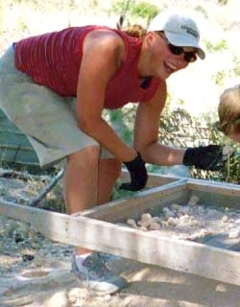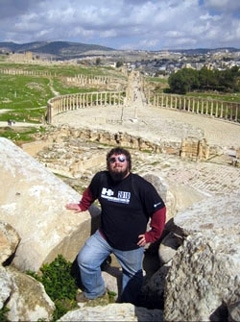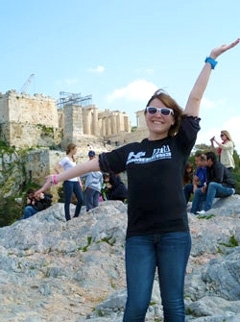Study Abroad
Classics students have many opportunities to explore the ancient world in its own setting, through study-abroad programs such as the College Year in Athens and the Intercollegiate Center for Classical Studies in Rome.
Many study abroad programs are open to you. Imagine reciting a speech of Cicero in the Roman senate house, enjoying fresh seafood while gazing across the Straits of Actium, running a footrace at Olympia, or strolling through the dusty streets of Pompeii.
Click here for an essay by a GVSU Classics alumnus about his experiences studying abroad.
As a Classics major, you can easily meet program requirements while gaining a unique perspective about life in ancient Greece and Rome. Through study abroad you'll also set yourself apart from other job-seekers and graduate-school applicants in an increasingly competitive market.
Study abroad can help you...
- expand your cross-cultural communication and problem-solving skills.
- broaden your academic horizons.
- improve your language skills.
- build confidence in yourself personally and professionally.
- gain a deeper understanding of Classical cultures -- study abroad provides a context in which ancient history and literature come to life.
Can I afford to study abroad?
YES! Early planning for study abroad helps you make cost-effective program decisions, and it also helps you prepare your finances through savings, scholarships, and financial aid. Financial aid applies to study abroad and, in some cases, your loan eligibility will increase to cover additional expenses.
Grand Valley State University's Padnos International Center offers grants and scholarships to qualified participants in several study abroad programs. The Padnos International Center provides resources on these and a variety of other scholarships available to undergraduate students.
Stop by the Padnos International Center to learn more about your options.
Do I need to speak a foreign language?
NO! Most study abroad programs offer instruction in English, even in non-English-speaking countries.
Will I take longer to graduate?
NO! With good advance planning, you can take courses that satisfy elective requirements in the Classics major or the general education program.

Crystal Daining (class of 2007) discovers an ancient coin while excavating in Greece with Prof. Melissa Morison.
Next Steps
What are my next steps?
⇒ Set goals and plan for results
Classics students can study abroad at any time during their four years at GVSU. Students should be aware, however, that the Classics capstone -- which normally should be taken in the senior year -- is only offered in the Winter semester. Be sure to discuss your plans with your Classics advisor as early as possible.
The process of selecting a study abroad program is similar to selecting your major or minor:
- Begin at least six months in advance of your study abroad. It is never too early to start planning, so that you don't miss application deadlines.
- Set some goals. There is not just one program best suited for all Classics students. There are many good study abroad programs, and the best one for you depends on what you want to achieve during your time abroad.
- Prioritize your goals. Consider your long-term academic and professional goals, as well as your on-campus degree requirements.
- Prepare academically. You may need to take language or other prerequisite courses for your chosen program.
- Give yourself time to research programs and talk to Classics students who have studied abroad. Classics faculty also have direct experience with a wide variety of study abroad programs.
⇒ 1st meeting with your Classics Department advisor
Once you have decided that you are interested in study abroad programs in Classics, meet with your Classics advisor. Discuss with your advisor your interest in study abroad. Consider ways that specific study abroad programs can best address your interests and plans. Some students enjoy the opportunity to live abroad for a year or a semester while others benefit from participation in highly focused summer programs. The best program is the one that best addresses your personal goals and interests.
⇒ Attend an Information Session at Padnos International Center
Gain additional information about study abroad resources and advising by attending an Information Meeting at the Padnos International Center.
⇒ 2nd meeting with your Classics advisor
Classics students planning to study abroad will need to communicate closely with their academic advisors throughout the planning process. When you decide on the program that will work best for you, you should begin an online study abroad application at www.gvsu.edu/studyabroad. Be sure to pay close attention to application deadlines.
Be sure to meet again with your advisor at least three months prior to departing for your program. The Classics department must approve any Classics courses you wish to take to ensure that they will be counted toward your degree requirements. Bring the course descriptions of the courses you would like to take abroad to this meeting along with the credit transfer form provided by the Padnos International Center.
Keep in mind that students are also able to fulfill General Education requirements abroad. Contact the Padnos International Center directly for information on the appropriate process.

Scott Schupbach (class of 2010) above the oval Roman forum in Gerasa (mod. Jerash), Jordan.
Academic Considerations
Academic Considerations for Classics Students
Review the following reminders and suggestions from the Classics Department before beginning your planning for study abroad.
Recommended learning outcomes for study abroad in Classics
- Increased understanding and appreciation of the monuments and other physical remains of ancient Greek and/or Roman culture, and of the climate(s) and landscape(s) that shaped those cultures
- Increased understanding and appreciation of the living cultural legacy of ancient Greece and/or Rome, and of the ways that ancient cultures are understood by their successors in the Mediterranean world
- For semester-and year-long programs: Ongoing development of skills in ancient Greek and/or Latin at levels that sustain degree progress
Classics Major: Emphases
- Within the Classics Major there are three emphases: Classical Languages, Classical Studies, and Latin Secondary Education. Each emphasis serves students with different academic interests and career goals, and each has a different focus with respect to specific coursework requirements in Greek and Latin. Students should consult with a Classics department faculty advisor to discuss study abroad programs that best address the focus of their chosen degree emphasis and other interests. (See Suggested Program Options below.)
- Please note that several study abroad programs offer Greek and/or Latin, but not necessarily at advanced levels equivalent to the 300 level at GVSU. Students should be sure to discuss this issue with a Classics advisor as part of the study abroad planning process. Plan carefully so that you do not find yourself out of step upon return to GVSU.
Classics Major: Core Classes
- Regardless of emphasis, all Classics Majors must complete a basic Language Core and Cultural Core.
- To fulfill the Language Core, all students must complete 7 hours of Latin or Greek at the 200-level or above. Most students fulfill this by completing LAT or GRK 201 (4 credits) and LAT or GRK 202 (3 credits).
- To fulfill the Cultural Core, all students must complete CLA 195, CLA 395, and CLA 495 (capstone).
- Classes taken as part of a study abroad experience may be counted toward the language core, subject to department approval prior to participation in the program abroad. Cultural Core classes do not normally have a study abroad equivalent.
Classics Major: Capstone
- Regardless of emphasis, all Classics Majors must complete CLA 495, the Classics Capstone; normally this class should be taken in the senior year.
- The Capstone is currently offered in Winter semesters only.
- Because the Capstone functions as a shared culminating experience for all GVSU Classics majors, it is unlikely that courses at other institutions will be regarded as appropriate substitutes for this class.
Major courses: Classical Languages emphasis
In addition to the Core courses, the Classical Languages emphasis requires a minimum of 18 additional credit hours of either Greek or Latin; at least 6 hours in one language at the 300 level or above. Subject to department approval, advanced Latin or Greek classes taken as part of study abroad may be counted toward fulfillment of this requirement.
Major courses: Latin Secondary Education emphasis
In addition to the Core courses, the Latin Secondary Education emphasis requires an additional 15 hours of Latin at the 300 level or above AND Latin Prose Composition. Subject to department approval, advanced Latin classes taken as part of study abroad may be counted toward fulfillment of this requirement. Students should be aware, however, that most study abroad programs do not offer appropriate substitutes for Latin Prose Composition.
Major courses: Classical Studies emphasis
In addition to the Core courses, the Classical Studies emphasis requires students to complete 15 hours of departmental and nondepartmental courses according to an approved study plan. Classes taken as part of a study abroad experience may be counted toward the above 15 hours, subject to department approval prior to participation in the program abroad. Work with your advisor to select the program that best suits your particular interest(s) and ideas you plan to explore in the course of your study of the Classical Tradition.

As a junior, Katie Oyama (class of 2013) was the recipient of the Benedetta and Giancarlo Galassi-Bera Scholarship. The $19,000 award paid for a semester of study at the Intercollegiate Center for Classical Studies. Administered by Duke University, ICCS provides undergraduate students with an opportunity in Rome to study ancient history, archaeology, Greek and Latin literature, Italian language and ancient art.
Program Options
Suggested Program Options for Classics students
College Year in Athens (Year, Semester, Summer)
College Year in Athens is a study abroad program focused upon the history and civilization of Greece and the East Mediterranean region. Its mission is to offer each student an academically rigorous program of studies combined with the vibrant experience of day-to-day contact with the people, monuments, and landscape of Greece -- a rapidly changing country with a uniquely varied past. For more than four decades, College Year in Athens has offered unparalleled learning opportunities in Greece. Incorporated in 1962, College Year in Athens was the first study-abroad program in Greece for English-speaking undergraduates.
Program focus: Classical Greek culture, art, archaeology; Ancient Greek; Modern Greek language and culture
Best suited for: Any student interested in Ancient or Modern Greek language, history, and culture; students with interests in service learning opportunities while in Greece
Arcadia University / Arcadia Center for Hellenic, Mediterranean, and Balkan Studies (Year, Summer)
Both academic year and summer study with Arcadia offer you the opportunity to explore Greek life and culture beyond Athens. Many courses include excursions to sites of historical and cultural importance. The unique "Greek Key" immersion course was designed to aid students in the cross-cultural learning process and involves students in Greek community life. The new "Myths and Monuments" summer program combines study in Athens, Rome, and Sicily (with emphasis on ancient Greek culture).
Program focus: Classical Greek culture, art, archaeology; Ancient Greek; Modern Greek language and culture
Best suited for: Any student with particular interest in modern Greek culture, politics, and cultural immersion as well as ancient history and culture, broadly defined
studyabroad.arcadia.edu/find-a-program/our-centers/athens/
See also arcadia.edu/abroad/default.aspx?id=14630 for the "Myths and Monuments" summer program.
Special considerations: Offers both Greek and Latin at all levels, as well as comprehensive course offerings in Greek history and philosophy; special coursework in Byzantine and Modern Greek culture.
Kentucky Institute for International Studies (Summer)
The KIIS program in Greece offers students the chance to study and travel for five weeks in a country of dramatic natural beauty and rich cultural traditions. The fascinating culture of modern Greece provides the ideal setting for learning about the ancient Greeks whose literature, political ideas, philosophy, art and architecture continue to shape our lives.
Program focus: Greek art, archaeology, drama
Best suited for: Students whose interest is primarily in ancient Greek, especially drama, who want an overview of Greek art, architecture, and topography.
Special considerations: As noted on the KIIS website, "Prospective students should be aware that the Greece program is very strenuous. You should be prepared to 1) walk at least a mile or two each day; 2) walk over stony, rough or slippery paths at archaeological sites; and 3) protect yourself in the hot Mediterranean climate by always carrying water, wearing hats, etc. 4) be prepared if susceptible to motion sickness, as we will travel extensively by bus and ferry."
John Cabot University (Year, Semester)
John Cabot University was founded in 1972 as a college of liberal arts and sciences. All courses are taught in English except Italian language and literature. The main campus in Rome is near the Vatican. Students are surrounded by thousands of years of history and art.
Program focus: Roman history, topography, architecture; Art History; Literature
Best suited for: Students interested in Classical Tradition, Art History, Archaeology
Special considerations: Advanced Latin and Greek offered by individual arrangement only, not as regular classes.
Intercollegiate Center for Classical Studies in Rome (Semester)
The Intercollegiate Center for Classical Studies in Rome (ICCS) was established in 1965 by representatives of 10 American colleges and universities; the number of member institutions (including GVSU) has now grown to over 100. It provides undergraduate students with an opportunity in Rome to study ancient history and archaeology, Greek and Latin literature, and ancient art. Many classicists currently in the field are alumni of the ICCS Rome program and look back fondly on their experience at the Centro.
Program focus: Roman history, topography, art, and architecture; Latin and Ancient Greek
Best suited for: Students interested in an intensive overview of Roman architecture and topography, who also want to continue with focused language study
Duke Global Education - ICCS Rome
Special considerations: Appropriate Latin and Greek instruction for advanced students offered every semester.
In addition to the programs listed above, numerous opportunities exist for summer archaeological fieldwork at ancient Greek and Roman sites throughout the Mediterranean. These programs provide excellent opportunities to gain first-hand knowledge of Greek and Roman material culture and to experience traditional Mediterranean village life. With some exceptions, archaeological field training programs are often limited to a few years' duration and therefore opportunities in this area change regularly.
These programs also vary widely in research focus, duration, price, accommodations, and academic prerequisites. If you are interested in pursuing an archaeological field training program specific to ancient Greek or Roman culture, consult a designated Classics department faculty advisor for current information and suggestions regarding an appropriate program for you.
Please be aware that application deadlines for many field training programs fall early in the academic year, and many programs require significant financial deposits well before the summer work begins.

Betsi Bryker (class of 2013) visiting Athens while studying abroad in Rome.
